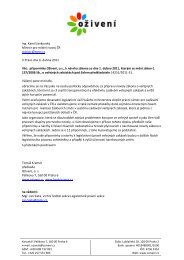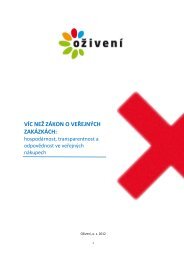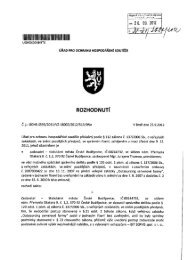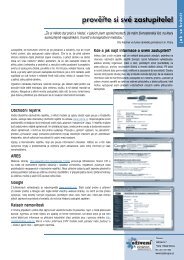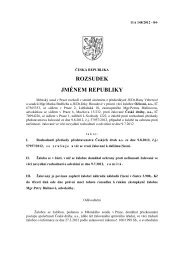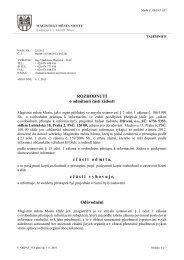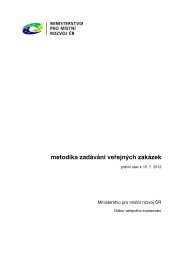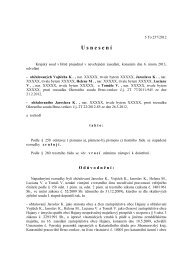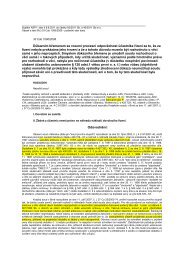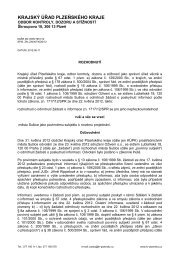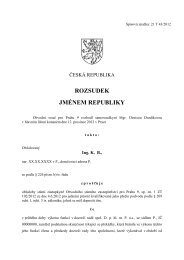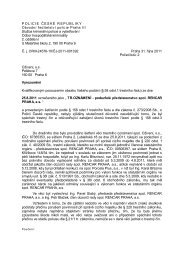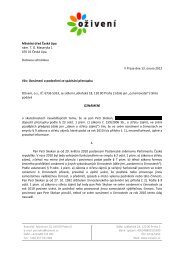Managing Conflict of Interest - Organisation for Economic Co ...
Managing Conflict of Interest - Organisation for Economic Co ...
Managing Conflict of Interest - Organisation for Economic Co ...
You also want an ePaper? Increase the reach of your titles
YUMPU automatically turns print PDFs into web optimized ePapers that Google loves.
Defining <strong><strong>Co</strong>nflict</strong> <strong>of</strong> <strong>Interest</strong> 7• The <strong>Organisation</strong> <strong>for</strong> <strong>Economic</strong> <strong>Co</strong>-operation and Development:Guidelines <strong>for</strong> <strong>Managing</strong> <strong><strong>Co</strong>nflict</strong> <strong>of</strong> <strong>Interest</strong> in the PublicService—Public Sector Transparency and Accountability;• The <strong>Co</strong>uncil <strong>of</strong> Europe: Model <strong>Co</strong>de <strong>of</strong> <strong>Co</strong>nduct <strong>for</strong> PublicOfficials (Article 13: conflict <strong>of</strong> interest).It is interesting to note that the first anti-corruption instrumentaddressing COI was the International <strong>Co</strong>de <strong>of</strong> <strong>Co</strong>nduct <strong>for</strong> PublicOfficials. 2 The <strong>Co</strong>de <strong>of</strong> <strong>Co</strong>nduct was a direct product <strong>of</strong> the EighthUnited Nations <strong>Co</strong>ngress on the Prevention <strong>of</strong> Crime and the Treatment<strong>of</strong> Offenders, held in Havana, Cuba, in 1990. The <strong>Co</strong>de <strong>of</strong><strong>Co</strong>nduct makes extensive references to COI, outlining the mostcrucial parameters <strong>of</strong> the concept and including several measuresto deal with it.Overview <strong>of</strong> UNCAC Provisions on <strong><strong>Co</strong>nflict</strong> <strong>of</strong> <strong>Interest</strong>The UNCAC is a fundamental preventive tool with several specificprovisions related to COI. UNCAC emphasizes the importance<strong>of</strong> transparency and standardization. Several provisions instruct“States Parties” to establish standards to guide public sector <strong>of</strong>ficials’behavior and codify systems to ensure legal procurementpractices and management <strong>of</strong> public finances. UNCAC also outlinesguidelines <strong>for</strong> dealing with the private sector. A summary <strong>of</strong>the most relevant provisions is included below:• Public sector (Article 7 §3): Each State Party shall endeavourto adopt, maintain and strengthen systems that promotetransparency and prevent conflicts <strong>of</strong> interest.• <strong>Co</strong>des <strong>of</strong> conduct <strong>for</strong> public <strong>of</strong>ficials (Article 8 §6): Each StateParty shall take note <strong>of</strong> the relevant initiatives <strong>of</strong> regional,interregional and multilateral organizations, such as theInternational <strong>Co</strong>de <strong>of</strong> <strong>Co</strong>nduct <strong>for</strong> Public Officials containedin General Assembly resolution 51/59 <strong>of</strong> 12 December1996...and endeavour to establish measures and systemsrequiring public <strong>of</strong>ficials to make declarations to appropriateauthorities regarding their outside activities , employment,investments, assets and substantial gifts or benefits from2United Nations General Assembly Resolution 51/59, 12 December 1996.ADB/OECD Anti-<strong>Co</strong>rruption Initiative <strong>for</strong> Asia and the Pacific



